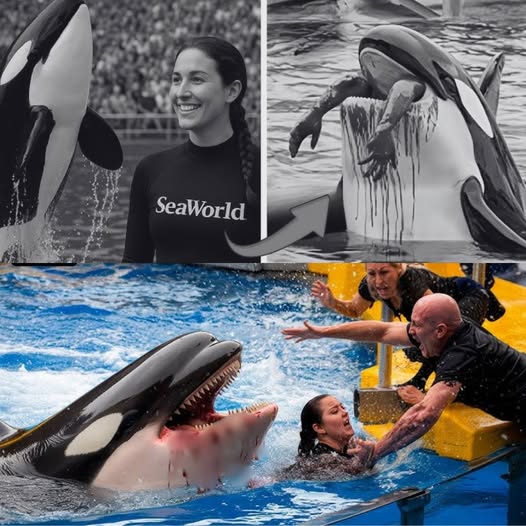A devastating incident has rocked the marine entertainment world and saddened animal lovers globally. Jessica Radcliffe, a 26-year-old experienced and dedicated orca trainer, tragically lost her life after a performing killer whale unexpectedly turned aggressive during what was meant to be a routine show.
The Incident
The terrifying attack, which was captured on video and has since gone viral, has horrified viewers and reignited fierce debates over the ethics and safety of keeping large marine mammals in captivity.
Jessica had worked closely with the orca at a renowned marine park for several years. She was known not only for her expertise and calm composure but also for the deep bond she shared with the animals she cared for. Loved by her colleagues and admired by audiences, she was a beloved figure in the marine community.
On the day of the tragedy, Jessica was performing a well-rehearsed routine that she and the orca had executed many times before. Confident and smiling, she approached the massive creature in the water, unaware that this would be her final performance.
Witnesses recount a sudden and shocking change in the orca’s behavior. Without warning, the whale lunged at Jessica, grabbing her and pulling her violently under the water. Trainers on the sidelines rushed to assist, but the sheer size and strength of the animal made rescue efforts extremely difficult. After several harrowing minutes, the orca released her—but by then, it was too late.
Response and Investigation
The marine park expressed profound sorrow in a statement, calling Jessica “one of our most dedicated and valued team members.” All live shows have been suspended while an internal investigation takes place. The incident has heightened concerns among animal rights advocates and marine biologists about the inherent dangers of keeping apex predators in captivity for entertainment.
Although the official cause of the orca’s sudden aggression remains under investigation, experts highlight the psychological and physical stresses captivity imposes on these highly intelligent creatures.
Expert Insight on Captivity
Dr. Emily Carver, a marine mammal specialist, explained:
“Orcas are complex, highly social animals with vast natural ranges. In the wild, they travel hundreds of miles a day and live in intricate family groups. Captivity restricts their natural behaviors, often leading to stress, frustration, and sometimes aggression. These are not animals that can be domesticated or controlled like pets.”
The Bigger Picture
Jessica’s tragic death has sparked an outpouring of grief and anger from friends, family, and fans. Animal welfare groups have intensified calls for laws banning orcas from live performances, citing past incidents where trainers were seriously injured or killed.
This heartbreaking event recalls similar tragedies that forced marine parks worldwide to reevaluate their practices. Social media has seen a surge of hashtags such as #JusticeForJessica and #EmptyTheTanks, reflecting growing public demand for change.
Many share clips of the attack alongside discussions about the ethical implications of marine mammal captivity, while others honor Jessica’s passion for ocean conservation and her unwavering commitment to the animals she loved.
While marine parks argue that shows promote education and awareness, critics counter that such displays misrepresent these animals’ natural behaviors and welfare needs.
In captivity, orcas are separated from their family pods, deprived of their natural hunting techniques and migratory patterns. Experts warn that this confinement can provoke stress-induced aggression and unpredictable behavior, often leading to tragic outcomes.
A Somber Reminder
Jessica Radcliffe’s passing is a heart-wrenching reminder of the profound risks faced when humans interact closely with powerful wild animals—especially in artificial settings.
As footage of the incident continues to circulate online, it challenges us all to recognize the reality: orcas are not performers; they are apex predators with instincts and needs that cannot simply be overridden by training.
